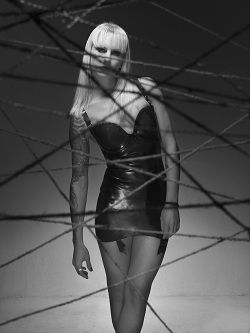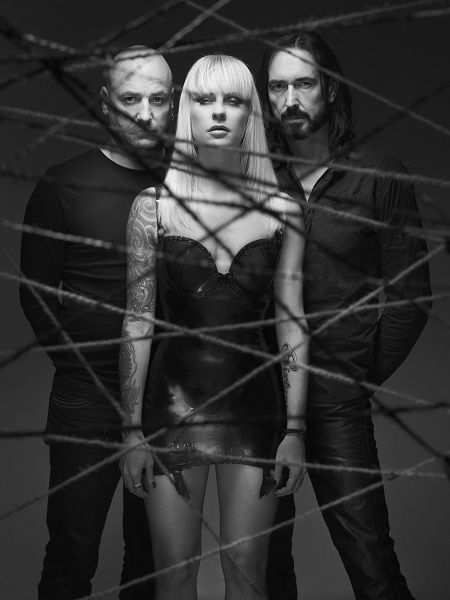
Interview by Matteo Bussotti

As far as we knew about the release of 69 Chambers‘ 2nd album, “Torque”, we felt we had to talk to Nina about it. Their sound and their history (and Nina‘s one in particular) is so unique that we couldn’t let escape the opportunity to ask her many things about them. “Torque” is a very enjoyable CD and Nina is a person with a really complex, characteristic and interesting background. She moved around the world, especially in L.A. and she reflects her open-minded attitude in her music. She’s also a very skillful musician, singing AND playing bass at the same time in 69 Chambers! So, here’s what she told us about who she is, her past, “Torque”, and also something about her (and 69 Chambers‘) future!
Hi Nina, we’re glad to have you here on Femme Metal! So, how is playing bass AND singing in a Metal band?
It’s great of course! I couldn’t imagine only singing or only playing an instrument in a band, I’ve always felt more comfortable doing both, even though it takes a little more practicing to get it done right. Especially with the new album where there are many rhythmical elements combined with straight-forward singing..
We know 69 Chambers (which you founded) background is full of cultural diversities. During your childhood you’ve been to South Korea and Singapore, you’re Swiss, and your very first album was written while you were in USA, in L.A., after going around in different clubs and open mic nights. So, in what way all this background affected your musical style?
My background has definitely affected on me as a person, so I’m sure it’s found its way into my music as well, if only unconsciously. It made me more open to different styles and less willing to fit into a certain scheme. You can probably hear that in 69 Chambers’ music.
What is the meaning of your name, where do these “69 Chambers” come from?
I’ll have to leave you with a question mark. The band was founded many years ago and was only meant to be a hobby project at first. We never imagined having to answer that question in an interview…
I guess every band has a purpose when it’s formed, which may be delivering a special message to save the entire universe, or simply having fun playing around in various gigs. What was, and what is, the purpose behind 69 Chambers? And if there is, do you think you’ve accomplished it yet?
Do bands really have a purpose when they’re formed other than self-expression? It would be pretty pretentious to claim we’re trying to change things. We just do what we love doing, and we’re hoping that people can relate to the emotion our music evokes. Plus, everyone interprets something different into it, so I think a band’s ‘purpose’ is always rather individual.
What’s been so far the most difficult moment in your band’s history? And the best one?
Keeping a band together is the hardest thing. Ever since I founded 69 Chambers I’ve gone through so many line-up changes. Getting rejected by record companies, promoters or critics is tough, but when you know you can count on your band, it strengthens your will. When you’re a lone fighter though, and I was for many phases, then it takes a lot of guts and endurance to not lose faith. I’m glad that with our current line-up, with Diego Rapacchietti and Tommy Vetterli, we’re a real team. The best moments have always been playing great shows. Not only big festivals like Hellfest or Metal Female Voices, but also at small venues when the atmosphere was just crazy.
What can you tell us about L.A.’s musical scene, and how easy is for someone who really wants to get noticed to play some gigs around, even in clubs? What do you think L.A. has to teach us europeans, what can be imported, and instead what can we teach them?
To be honest, I didn’t go to L.A. to get noticed or follow some dream, I simply wanted to experience something new and different. I was kind of fed-up with the Swiss lifestyle where people have so much to lose they’re not willing to risk anything or just let go for a moment. Lots of young Americans, especially in L.A. have a different attitude to life, they might seem superficial, but they’re also really open, helpful and simply more relaxed. I especially enjoyed those open-mic nights cause there were all sorts of musicians – from really talented ones up to mere beginners, but they were equally respected by both musicians and the crowd. I’m sure being a little more easy-going, daring and less pretentious would to a lot of Europeans well. At the same time I found quite a few Americans being dreamers and unrealistic, and with little sense for what’s going on in the rest of the world…

How was playing at HellFest? How was meeting your fans abroad?
Hellfest was huge for us. Playing on mainstage one as a rather unknown band was a great honor. And even though we didn’t fit into the line-up a hundred percent (we were probably perceived as a “pop band” by many death metal fans) we did gain a lot of new fans in France who’ve been following us on Facebook ever since and expressing their enthusiasm. I sure hope we’ll be up on that stage again next year.
Talking about fans, what’s your relation with them, do you tend to be “expansive” when you meet them, or you tend more to be shy?
We enjoy talking to fans, it’s really interesting to see who the persons are that like our music. And we’re also grateful for their excitement. After all, you’re nothing as a band without your fans!
Some people completely change attitude when they’re on stage: some of them, being very shy, become absolute badasses; other ones, instead, become very frightened and shy while playing. What about you? What’s your attitude on stage? And another very important question: what about stage diving? Have you ever tried it? Do you think you will?
Honestly, you have to be bit of an actor when you’re up on stage, people want to be entertained. But I think you also have to remain credible, I’m sure fans have a good sense for what’s authentic and what’s not. I’m just not the type to go completely crazy on stage, that just wouldn’t be me, so I just try to express my feelings on stage the best I can. As for stagediving, with bass and high-heels I might just end up at the hospital. But who knows, perhaps I’ll try it one day…
Now, let’s talk about the “hot topic”: your latest album, “Torque”. What’s the story behind the album and its name? Are you satisfied with? Is there anything you’d like to change about it?
“Torque” is our second album and the name just felt right. Torque is a rotational force; it’s a measure of the turning force on an object, and for example pretty decisive for the power a car puts down on its wheels. We feel that with the current line-up and the new songs we have enough ‘torque’ to get the band accelerated. In contrast to the first album I practically wrote all by myself, the second album is the result of good teamwork. I still wrote most of the songs on my own, but Tommy and Diego each contributed to get the best out of them. Plus, Tommy did a really great job at recording and producing the new material. I also thing “Torque” makes a point of showing who we really are. Of course we already see what could have been done better – the moment something’s completed you’re already at a different level, but we put so much effort, time and heart blood into this product, I believe we did the best we could and we’re all pretty proud of that.
Is there a song in Torque you feel particularly “yours”, maybe for its meaning or for the story behind it?
All of the songs on the album are “mine”, except perhaps for the song “And Then There Was Silence” where Tommy composed the guitar riffs. Or the cover of Jeff Buckley’s “Grace”. I always put a lot of myself into the music and the lyrics, so there isn’t one particular song I could point out to.
Finally, what direction you think 69 Chambers will take in the future, are you open to experimenting with other genres, or sonorities, perhaps?
It’s perhaps a little early to think of a new direction. “Torque” is out and we first want to promote this album and go on tour with it. I’m sure time will tell, in which ways the band will further evolve. But experimenting with other influences always sounds great. After all, standing still means stepping backwards…
Thank you very much Nina for your time! We hope to see you soon at a concert! Goodbye and good luck for everything!
Thanks to you, Matteo and take care!
Links
MySpace * Facebook * Twitter * Site
Latest Multimedia